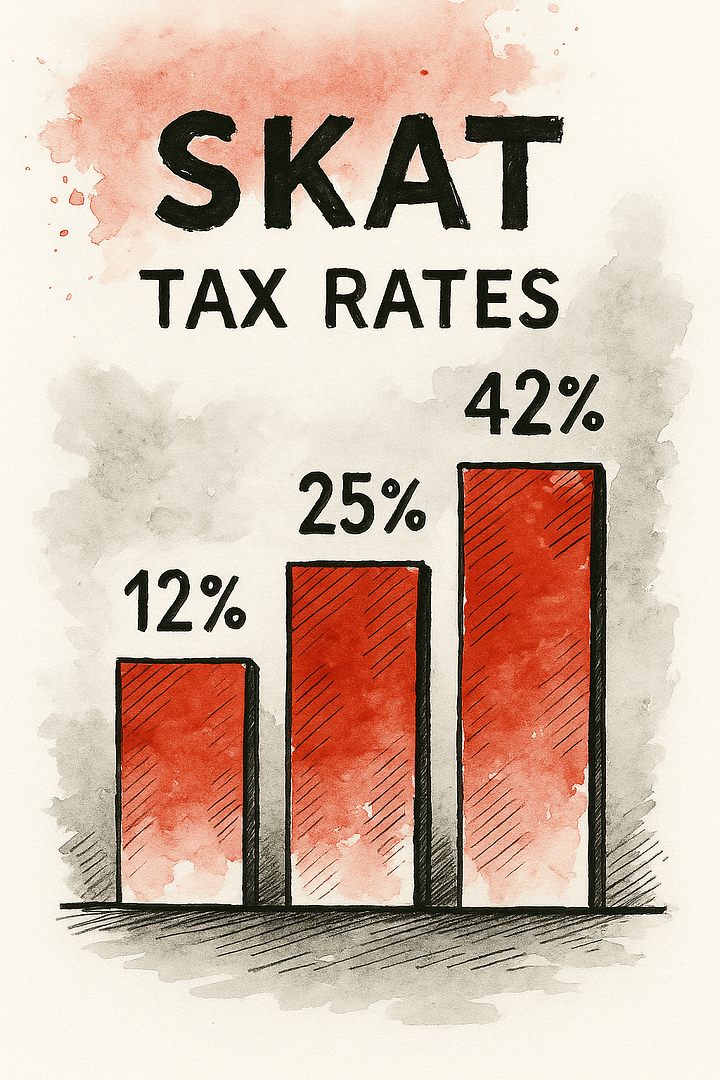The Danish Job Market in 2025
Explore Denmark’s job market, in-demand careers, and how to secure a work visa with ease.
Denmark’s Job Market in 2025: Small Country, Big Opportunity
If you’re new to the idea of working in Denmark, here’s the scoop: despite being a nation of under 6 million people, Denmark punches well above its weight when it comes to employment and innovation. In early 2025, the national employment rate hovered around 74.1%, one of the highest in the EU, with particularly strong demand in sectors like IT, engineering, construction, healthcare, and life sciences. Denmark is also home to over 300,000 foreign workers, and that number is steadily growing as companies look abroad to fill skills gaps. With generous parental leave, an average workweek of just 37 hours, and a culture that deeply respects work-life balance, it’s no wonder so many professionals are setting their sights on this Scandinavian gem.
Source: Statistics Denmark, Work in Denmark, Eurostat (2025)
What to Know
The Danish Job Market in 2025
Denmark offers a dynamic and competitive job market with a strong focus on innovation, sustainability, and work-life balance. The country is known for its highly skilled workforce, flat organizational structures, and a collaborative work culture that encourages employee autonomy. With a strong economy and a demand for international talent, Denmark presents excellent opportunities for skilled professionals across various industries.
Key Industries
Denmark’s economy is driven by key industries such as life sciences, renewable energy, IT & tech, manufacturing, and food production. The country is a global leader in sustainability, wind energy, and biotechnology, making it an attractive destination for specialists in these fields. Additionally, the maritime, finance, and logistics sectors continue to offer promising career opportunities.
Work Culture & Conditions
The Danish workplace is characterized by flexibility, trust, and efficiency. Employees enjoy some of the best working conditions in Europe, including a standard 37-hour workweek, strong labor rights, and generous parental leave policies. Denmark’s “flexicurity” model ensures job mobility while providing financial security, making it one of the best countries for work-life balance.
Job Opportunities for Foreign Workers
Denmark actively recruits international talent, particularly in sectors experiencing labor shortages. The Positive List highlights high-demand professions, making it easier for skilled workers to obtain a Danish work visa. The country also has visa schemes like the Fast-Track Scheme and the Pay Limit Scheme, allowing foreign professionals to access the job market more efficiently.
Finding a Job in Denmark
Job seekers can explore opportunities through online job portals, recruitment agencies, and company career pages. Networking plays a crucial role in the Danish job market, with many positions filled through professional connections. Expats are encouraged to learn Danish, as language proficiency can significantly improve job prospects, even in international companies.
Entrepreneurship & Startups
Denmark offers a welcoming environment for entrepreneurs, with streamlined business registration, access to startup hubs, and government-backed funding options. The country encourages innovation through initiatives like Startup Denmark, which supports non-EU founders with scalable business ideas. While English is widely used in business, building local networks and understanding Danish work culture can greatly enhance your startup’s success.
Contact/FAQs/Articles
Contact Us Anytime
Reach out to us for personalised advice or to schedule a consultation.
Thinking about moving to Denmark? We’re here to help! Whether you need guidance on work visas, residency permits, housing, or life in Denmark, our team is ready to provide clear, advice tailored to your situation.
FAQs about Moving to Denmark
Your Essential Questions Answered: Everything You Need to Know About Moving to Denmark.
Learn More About Work/Life in Denmark

Understand Danish Taxation and Health Care in 2025
Primary keyword: “Understand Danish Taxation and Health Care” Quick-Read Takeaways 1 │ Why Taxes & Healthcare Are a Package Deal in Denmark Denmark links its digital identity (CPR), tax administration (SKAT) and national health service. No CPR → no tax…

Secure Housing Before You Move to Denmark
Quick-Read Summary 1 | Why “Secure Housing” Is Literally Step One Danish residence-permit rules oblige newcomers to show a permanent address before CPR activation. No address → no CPR → no bank account, pay-cheque, doctor or MitID login. Add in…

Registering with Danish Authorities Is Mandatory
1 | Why Registration Is Non-Negotiable Denmark’s digital public sector runs on the CPR number. Without it you cannot: Failing to register (or registering late) breaks the Folkeregisterloven and may incur fines—plus weeks of frustrating delays. 2 | Legal Requirements…

Building Your Social and Professional Network in Denmark
Establishing and nurturing a strong social and professional network is crucial for both personal and career growth. A robust network opens doors to new opportunities, fosters collaboration, enhances personal development, and supports you during career transitions. This guide will explore…

Embracing Everyday Life in Denmark
Moving to Denmark offers an exciting opportunity to experience a balanced lifestyle, vibrant culture, and exceptional quality of life. Understanding how a typical day unfolds in Denmark can greatly ease your transition and help you integrate smoothly into Danish society….

Navigating the Danish Visa and Immigration Processes
Denmark consistently ranks among the top countries globally for its excellent quality of life, exceptional education system, stable economy, and inclusive society. These factors make Denmark particularly appealing to expatriates, international students, and families looking to relocate. However, navigating the…

Understanding Danish Work Culture
Danish work culture is globally admired for its balanced approach to professional life, openness in communication, and strong emphasis on collaboration and equality. However, adapting to Denmark’s distinctive workplace norms can be challenging for newcomers. This comprehensive guide dives deep…

Special Visas Including Asylum in Denmark
Understanding special visas including asylum in Denmark is essential if you seek protection or specialized residency due to unique circumstances. This step-by-step guide will walk you logically through the entire process, clearly explaining each crucial stage. 1. Types of Special…

Study and Other Visas in Denmark
If you plan to study or stay in Denmark for reasons other than employment or family reunification, understanding the process of obtaining study and other visas in Denmark is crucial. This detailed guide covers everything from eligibility criteria to the…
